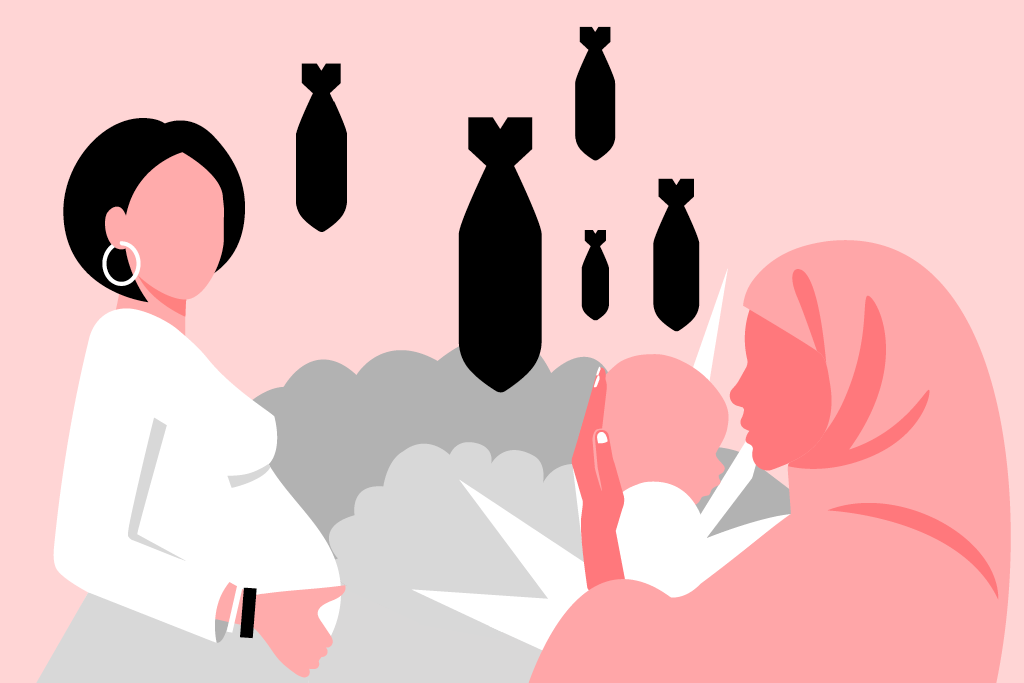Obstetric violence in Gaza: A crisis affecting women’s health
Israel's ongoing attacks on Gaza have led to a devastating form of violence against women that takes place in silence—obstetric violence. The Kvinna till Kvinna Foundation is now highlighting the challenges faced by pregnant, postpartum, and breastfeeding women in Gaza and the serious health consequences they face.

Since the beginning of the war, tens of thousands of people have been killed. While 1.7 million people are displaced in Gaza, approximately 180 women are estimated to give birth every day and are exposed to major health risks as they are forced to undergo childbirth in very difficult conditions.
The number of miscarriages has increased by 300 percent
Israel’s indiscriminate attacks on Gaza have devastating consequences on women’s reproductive health. The attacks on the various hospitals have significantly limited access to necessary prenatal care, and reports show that the number of miscarriages has increased by 300 percent. The lack of resources such as hygiene products, clean water and medical supplies is further exacerbating the situation.
Gaza used to have 36 hospitals, but according to the WHO, 84 percent of all health facilities have been destroyed, including the maternity ward. As of now, only two hospitals offer maternity wards and maternity care. That is not enough for more than 5,500 women who will give birth within the next month.
“I have been forced to flee and live in a tent on the street. I’m nine months pregnant and it’s my firstborn. But I don’t want to give birth because I can’t meet my baby’s basic needs, like clothes and a clean place. I hope to find a safe shelter for my child so that I can protect him from the cold.
This is according to Hala*, one of the women to whom one of The Kvinna till Kvinna Foundation’s partner organisation spoke to. Pregnant and newborn women struggle with a lack of food and clean water and find it extremely difficult to take care of both their own and their newborns’ hygiene.
Caesarean section without anaesthesia
The health risks continue even after childbirth, as pain relief in caesarean sections is often lacking and disposable materials must be reused in hospitals. Diapers, clothes, vaccines, medicines, and milk substitutes are missing or have become very expensive.
“My baby was delivered by caesarean section, and it was very difficult. I was not anesthetised during the birth and was in incredible pain from all the needles and stitches. I got sick afterwards and was admitted to the hospital again. I also sell the canned food I receive as aid to be able to buy diapers and formula for my child,” says Salma*.
Breastfeeding women do not get enough food and water to produce the breast milk needed. The lack of hygiene products and clean water is causing diseases and infections to increase among women and children in Gaza. The blockade and lack of resources have led to widespread malnutrition, especially among breastfeeding women and children. Malnutrition also weakens the immune system and increases the risk of disease. The situation is now further exacerbated by Israel’s military operation against Rafah and the closure of the border crossing with Egypt, where much of the aid has come in before.
The psychological terror
At the same time, almost all women and children are extremely negatively affected by the stress and trauma triggered by the conflict. This has led to an increase in anxiety, depression, and post-traumatic stress disorder.
“Feelings of fear, anxiety and pain accompany me all the time. I was displaced when I was nine months pregnant. I can’t describe how it feels. My life has become hell,” says Maryam*.
Local women’s rights organisations are on-site
Local women’s rights organisations in the Gaza Strip are working to fill the resources gap by offering support, including psychosocial support to women and children. They also distribute supplies such as blankets, diapers, and sanitary products.
Long-term funding and support for sexual and reproductive health and rights are crucial for women and children in Gaza, as well as the implementation of the Women, Peace, and Security Agenda to protect women from postpartum violence. But above all, an immediate and permanent ceasefire is needed to end the violence and a long-term political solution to address the root causes of the conflict, including ending the occupation.
*Hala, Salma, and Maryam are fictitious names.
What is obstetric violence?
Obstetric violence is a form of reproductive violence and refers to the maltreatment and harm experienced by women during pregnancy, delivery and the subsequent postpartum period that have serious consequences for women’s health. It is violence at the intersection of institutional/structural violence and gender-based violence. In Gaza, this violence is exacerbated by the ongoing war, which is drastically affecting access to reproductive health and rights.